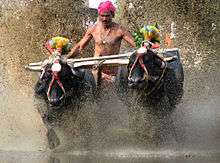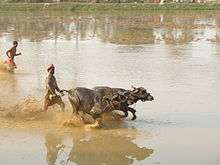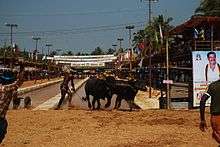Kambala


A kambala (Tulu & Kannada: ಕಂಬಳ) is an annual buffalo race held in the southwestern Indian state of Karnataka. Traditionally, it is sponsored by local Tuluva landlords and households in the coastal districts of Dakshina Kannada and Udupi, a region collectively known as Tulu Nadu.
The kambla season generally starts in November and lasts until March. The kambalas are organized through kambala samithis (Kambala Associations), of which there are currently 18. Over 45 races are held annually in coastal Karnataka, including smaller remote villages such as Vandaru and Gulvadi.

Format

Kambala is traditionally a simple sport which entertains rural people of the area.[1] The kambala ractrack is a slushy paddy field,[2] and the buffaloes are driven by a whip-lashing farmer.[3]
Traditional kambala was non-competitive, and the pair was run one by one. In modern kambala, the contest generally takes place between two pair of buffaloes. In villages such as Vandaro and Choradi, there is also a ritualistic aspect, as farmers race their buffaloes to give thanks for protecting them from diseases.
Historically, the winning pair of buffaloes was rewarded with coconuts and bananas. Today, winning owners earn gold and silver coins.[4] Some organising committees award an eight-gram gold coin as first prize.[5] In some competitions, cash prizes are awarded.
Innovations
Kambala has become an organised rural sport, with elaborate planning and scheduling to accommodate competietions at different places.[6] A "Kambala Committee" arranges races in several categories describing the outfitting of the buffaloes. Typical categories are:
- Negilu (ನೇಗಿಲು: plough), in which the buffaloes are tied to an apparatus resembling a plough, but lighter.
- Hagga (ಹಗ್ಗ: rope), in which a rope is tied directly to the buffaloes.
- Adda halage (ಅಡ್ಡ ಹಲಗೆ: cross wooden block), where the driver stands on a plank on top of the buffaloes.
- Kane halage (ಕಣೆ ಹಲಗೆ: round wooden block), where the driver places one leg on the wooden block.
Categories may have junior and senior divisions.[7]
Kambala draws large rural crowds, as it has done for the last three hundred years.[8] People bet on the buffaloes, and one can witness more than 20,000 spectators in a well-organised Kambala, egging on and cheering the buffaloes to complete the race.
In some places, night races are arranged under floodlights.[5]
The buffaloes developed for the race are carefully fed and some owners have even built separate swimming pools for competing buffaloes.[9]
Kadri kambala
Kadri Kambala used to be held at Kadri, Mangalore and it is called Devara Kambala (God's kambala) as it is associated with Sri Manjunatha Temple in that city.[6] This event was patronised by the Alupa kings of Mangalore, 300 years ago. For this reason, Kadri kambala is also known as Arasu kambala (king's kambala).[6]
Legal status
Animal lovers have criticised kambala as cruel to the racing buffaloes, which are driven by whips.[10] Noted animal-rights activist Mrs. Maneka Gandhi expressed concerns about the ill treatment of buffaloes during the race. Kambala organisers contend that whips are necessary to elicit maximum speed. Government officials advise the riders to be gentle on buffaloes and avoid using whips during the race.[10]
In 2014, based on lawsuits filed by animal welfare organizations, the Supreme Court of India ordered a ban on kambala. The ban also covered jallikattu, a sport of hands-on bull taming. A government order lifted the ban on jallikattu in January 2017, and the public asked for the ban on kambala to be lifted too.[11]
The Prevention of Cruelty to Animals (Karnataka Amendment) Ordinance, 2017[12] re-legalized the kambala festival in Karnataka.[13] President Pranab Mukherjee promulgated the new law on July 3, 2017. Litigation continued but was resolved by the passage of the Prevention of Cruelty to Animals (Karnataka Amendment) Bill, 2018, which President Ram Nath Kovind approved on February 19, 2018.[14]
Schedule
| Town/Village | Taluk | Date of Kambala | Appx. pairs | Image | Remarks |
|---|---|---|---|---|---|
| Kadri[2] | Mangalore | December |  |
Competitive race:Much famed | |
| Vandaru | Kundapura | December | 300 |  |
Non competitive race |
| Pilikula[4] | Mangalore | December/January | 150[15] |  |
Competitive race |
| Choradi | Kundapura | December | 150 | Non competitive rural sport | |
| Gulvadi | Kundapura | December | 200 | Non competitive rural sport | |
| Baradi beedu | Karkala | December | Competitive race | ||
| Venur Permuda | Belthangadi | December | |||
| Moodabidri | Mangalore | December | Competitive race | ||
| Miyar | Karkala | January | Lava Kusha Jodukere Kambala. | ||
| Katapadi beedu | Udupi | January | competitive race | ||
| Aikala Bava | Mangalore | February | competitive race | ||
| Adve, Nandikur | Udupi | January | competitive race | ||
| Pajir | Bantwala | February | |||
| Yeedu | Karkala | February | |||
| Puttur | Puttur | March | |||
| Jappina Mogaru[5] | Mangalore | March[5] | 150[5] | ||
| Uppinangadi | Puttur | March | |||
| Bangadi Kolli | Belthangadi | March | |||
| Thalapady Panjala | Mangalore | March/April | |||
| Althar | Udupi | March/April | |||
| Parika Aramane | Udupi | Nov/Dec | |||
| Hokkadi goli | Bantwala | December | |||
| Handadi | Udupi | December | |||
| Vaddambettu[16] | Udupi | December[16] | |||
| Ajri[17] | Udupi | December | |||
| Mulki seeme | Mangalore | December | competitive race |
Manday Horvara Mane Kambala December
References
- ↑ Chaudhari, edited by Sarit K. Chaudhari, Sucheta Sen (2005). Primitive tribes in contemporary India : concept, ethnography and demography. New Delhi: Mittal Publications. p. 120. ISBN 9788183240260.
- 1 2 "Kadri comes alive with 'Kambala', fair". The Hindu. 13 December 2010. Retrieved 7 December 2012.
- ↑ Herzberg, Esther Grisham,Christine Ronan,editor-Roberta Dempsey (1997). South India (sb ed.). Glenview, IL: Good Year Books. p. 5. ISBN 9780673363596.
- 1 2 "Kambala". The Hindu. 26 December 2011. Retrieved 7 December 2012.
- 1 2 3 4 5 "Day and night kambala in Jeppinamogaru on March 19". The Hindu. 16 March 2011. Retrieved 7 December 2012.
- 1 2 3 "All set for Kambala season from tomorrow". The Hindu. 5 December 2009. Retrieved 23 February 2018.
- ↑ Dinesh Maneer (7 April 2011). "Kambala, the race of the buffaloes". Wordpress. Retrieved 23 February 2018.
- ↑ "Kadri Kambala witnesses confluence of Tulu culture". Deccan Herald. 2 December 2012. Retrieved 7 December 2012.
- ↑ "Chill-out zone for buffaloes". The Hindu. 18 September 2012. Retrieved 7 December 2012.
- 1 2 "Pilikula Nisargadhama plays host to Kambala". The Hindu. 10 January 2012. Retrieved 7 December 2012.
- ↑ "Jallikattu Back, Why Not Kambala, Asks Karnataka. Protests Begin". NDTV.com.
- ↑ Ravi, Anusha (July 3, 2017). "Kambala is now legal in Karnataka, President promulgates ordinance". Oneindia.
- ↑ Kumar, Ganesh; Udayakumar, Radha (July 3, 2017). "President Mukherjee approves ordinance allowing the conduct of kambala in Karnataka". India Today.
- ↑ K.T. Vinobha (February 19, 2018). "President approves Bill allowing Kambala in Karnataka". Times of India.
- ↑ "Grandeur marks Pilikula Kambala". The Hindu. 22 December 2008. Retrieved 7 December 2012.
- 1 2 "Federation says Koraga people made to beat drums during kambala". 15 December 2011. Retrieved 7 December 2012.
- ↑ "Ajri Kambala". Kundaprabha (weekly). 4 December 2012. Retrieved 7 December 2012.
External links
| Wikimedia Commons has media related to Kambala. |